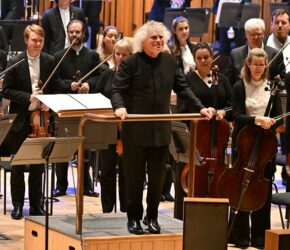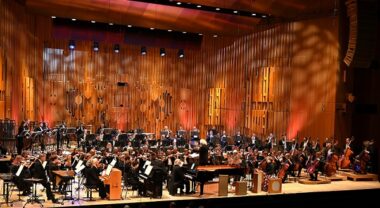
[ad_1]
 United Kingdom Jolas and Messiaen: Faustine de Monès (soprano), Peter Donohoe (piano), Cynthia Millar (ondes Martenot), London Symphony Orchestra / Sir Simon Rattle (conductor). Barbican Corridor, London, 15.6.2023. (MB)
United Kingdom Jolas and Messiaen: Faustine de Monès (soprano), Peter Donohoe (piano), Cynthia Millar (ondes Martenot), London Symphony Orchestra / Sir Simon Rattle (conductor). Barbican Corridor, London, 15.6.2023. (MB)

Betsy Jolas – Ces belles années
Messiaen – Turangalîla-Symphonie
Simon Rattle’s tenure as Music Director of the London Symphony Orchestra has been cruelly minimize quick by English nationalism. The UK’s departure from the European Union, along with Theresa Could’s spiteful quashing of a brand new live performance corridor mission on the grounds that it had been supported by her political enemy George Osborne, in the end proved an excessive amount of. And who can blame him, with a household in Berlin? There may be solely a lot preventing one can do. If an ideal metropolis resembling Munich made me a proposal, I ought to be off like a shot. Not that London on the whole or the LSO particularly has seen the final of Sir Simon; he’ll return as Conductor Emeritus, not least to proceed the Janáček opera sequence whose Katya Kabanova this January was so resounding a hit. The world is grim proper now; Britain is grim proper now. Maybe, although, we must always not solely despair. Even in straits as dire as these, the LSO and lots of of our cultural and mental establishments proceed to punch far above the burden our depressing, philistine rulers accord them. And a live performance resembling this, Rattle’s final on the Barbican as Music Director of the LSO, can nonetheless show the equal, even the envy, of the musical world.
The primary half – one can hardly say ‘half’ when it will need to have come to a couple of sixth the size of the remaining – was a brand new work by Betsy Jolas: Ces belles années. Given its first efficiency the night time earlier than, so not strictly a premiere, it proved typical of the composer, arguably typical of the musical and broader tradition wherein she is rooted, in each proving eminently ‘approachable’ and but reticent in yielding its secrets and techniques. The opening, untuned percussion ceding, or maybe remodeling/being remodeled into, the sounds of an orchestra neither small nor giant, sounded ominous, concord both enjoying a surprisingly ‘conventional’ position or pretending to take action. Whether or not that had been play or one thing extra ‘late’ and reconciliatory remained, a minimum of for me, within the stability. It’s tough, in fact, not to think about the work of a composer nicely into her nineties as ‘late’, simply as one did with Elliott Carter at that stage and past. (With Carter, one discovered oneself resorting to ‘late late…’ and finally merely to ‘most up-to-date’.) However right here there did appear, nonetheless, obliquely, to be a way of wanting again on a life or lives nicely lived, maybe as a lot a tribute, intentional or in any other case, to Rattle as the rest. There was unease within the tapering off of rejoicing: sung phrases and contours, delivered with laser-like, charismatic artistry by soprano Faustine de Monès, and likewise orchestral applause and foot-tapping.
Had been the soprano’s phrases, ‘for the event and with out pretension’, fairly so easy, even anti-literary, as they could appear? ‘Oh, la joie de ces beaux jours. Célébrons sans cesse ces beaux jours, toutes ces belles années, venez, venez, amenez vos amis. Et toi le tout petit dans ton berceau tu viendras aussi. Et vous là-bas qui passez, venez aussi. Chantons tous ensemble, chantons la joie.’ Maybe, or was there a minimum of a touch of despair or resignation in having reached this stage, whoever the topic could also be, solely to fall again on them. Who is aware of? That could be extra a query for the listener than the performer. Not everybody, in spite of everything, instantly resorts to Beckett or Mahler. The finely crafted precision of Jolas’s writing is tough to not stereotype as ‘Gallic’. In a means, why ought to one attempt, as long as it doesn’t save one the hassle – and rewards – of truly listening. If I discovered much less of an infectious sense of play than I typically have with Jolas’s music, possibly I shall simply need to attempt tougher — and/or hear otherwise. I ought to definitely welcome the chance.

No such doubts right here regarding Messiaen’s Turangalîla-Symphonie, although many have had them through the years, not least Pierre Boulez, first amongst equals in Messiaen’s galaxy of nice pupils. Boulez celebratedly or notoriously carried out solely the three ‘Turangalîla actions’ out of the entire ten, in a 1973 Proms efficiency of what he as soon as derided as ‘brothel music’. Some brothel! While in some ways a conductor in Boulez’s personal line – Rattle’s exploratory programming and collegiality certainly bear Boulez’s stamp – Rattle, not as far as I’m conscious a composer, has broader and likewise youthful sympathies. Certainly, as Boulez as soon as identified, previous to conducting an Olga Neuwirth premiere, while it would as soon as have made sense for him to declare Schoenberg useless, that was hardly a urgent concern for Neuwirth and her technology.
There have been hints, in a great way, of a Boulezian means in Rattle’s efficiency right here. Additional laser readability, satirically helped by the tough, dry Barbican acoustic which, miraculously, didn’t overwhelm, was definitely one in all them. One might hear each word, each line, each stability — or a minimum of fancied one might. (There may be Klingsor-Ravelian magic to Boulez too, in spite of everything.) And there have been at occasions indicators of a Boulezian ‘trendy classicism’, to borrow from Arnold Whittall, which one doesn’t essentially count on from Rattle. The ultimate motion, certainly, sounded and functioned way more like a standard symphonic finale than I can recall, earlier performances by Rattle included. Certainly, the work’s unfolding, pli selon pli when you like, was not solely remarkably affected person and inevitable; it made good sense of type and construction in a means I’ve not all the time discovered from Rattle in Austro-German repertoire.
The heat, although, even within the Barbican was solely Rattle’s personal — nicely, his, Messiaen’s, and the superlative performers’. Temperature might cool, as in these three ‘Turangalîla’ actions, however the bottom line was increased, might rise, and did. (Not that Boulez couldn’t be heat too, however another way.) The sheer big-heartedness of Messiaen’s imaginative and prescient, in addition to its paradoxically earthy mysticism, reaching for the celebs and but penetrating – definitely penetrating – deeper, didn’t merely got here throughout; it grabbed one by the throat and the rest that took its fancy. Peter Donohoe’s pianism would have been spellbinding in itself, cadenzas scintillating and plumbing depths that introduced affinities to Russian composers resembling Mussorgsky to vivid gentle. As a part of this orgiastic ceremony and riot it was all of the extra so. Likewise, Cynthia Millar’s ondes Martenot: a lot greater than an odd ‘impact’, akin to a continuo gone rogue, whose duetting and ensembles with all method of different devices was fairly one thing aurally to behold. A lot the identical could possibly be mentioned of Elizabeth Burley on celesta and Zeynep Özsuca on keyed glockenspiel. Melody, concord, rhythm, timbre, and a sheer pleasure in creation to rival Bach or Haydn had been each decided and radically free. There have been no soloists right here; moderately all took their place in a zany cosmology each developmental and static, for now and for eternity, of Messiaenic love.
Mark Berry
Each LSO concert events had been filmed for future broadcast on Marquee TV and Mezzo; this, the final of the 2, was recorded for future broadcast on BBC Radio 3 on 30 June.
[ad_2]